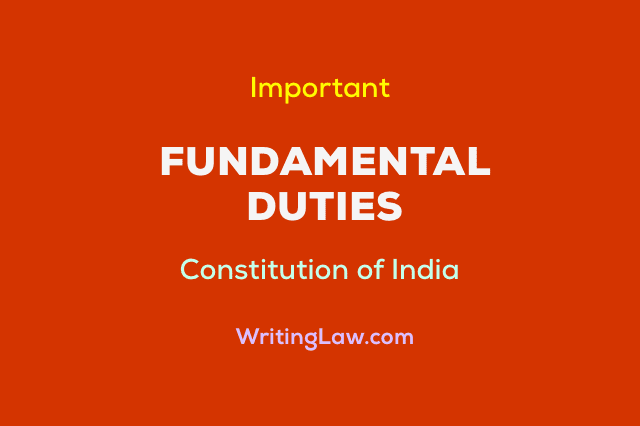
Fundamental Duties are enshrined under Part IVA, Article 51A of the Indian Constitution. Originally, the Constitution of India had no mention of Fundamental Duties. They were added through the 42nd Constitutional Amendment on the recommendations of the Swaran Singh Committee. The Fundamental Duties are inspired by the Constitution of the erstwhile USSR.
Article 29(1) of the Universal Declaration of Human Rights states that:
Everyone has duties to the community in which alone the free and full development of his personality is possible.
Swaran Singh Committee
The Swaran Singh Committee was set up to make recommendations on the need and importance of Fundamental Duties, which were felt during the national emergency of 1975-1977. The committee recommended the addition of a separate chapter regarding Fundamental Duties in the Constitution. The committee recommended the incorporation of eight Fundamental Duties. However, not all recommendations of the Swaran Singh Committee were accepted. At present, there are eleven Fundamental Duties in the Indian Constitution.
Must Read: 11 Fundamental Duties of the Indian Constitution.
42nd Amendment Act of the Indian Constitution
The Congress Government accepted the recommendations and enacted the 42nd constitutional amendment act, also known as the Mini-Constitution.
42nd constitutional amendment added a new Part IVA, which constituted Article 51A to the Indian Constitution and contained ten Fundamental Duties of the citizens.
Read Next: Why 42nd Amendment Is Called the “Mini Constitution of India”
Features of Fundamental Duties
- Fundamental Duties apply to all the citizens.
- Fundamental Duties consist of moral duties as well as civic duties.
- Fundamental Duties are non-enforceable.
Significance of Fundamental Duties
- In addition to the rights provided in the Constitution, a citizen should also be concerned about performing their duties towards the country; as rights and duties go hand in hand.
- Even though the Constitution doesn’t provide for the direct enforcement of Fundamental Duties by courts, the Parliament is free to implement them by suitable legislation.
- Fundamental Duties promote discipline and commitment among the citizens of the country.
- It acts as a warning against anti-social activities.
- Fundamental Duties promote ‘Responsible Citizenship‘, which can contribute to the country’s cultural development.
86th Amendment Act of the Indian Constitution
The 86th Amendment Act in 2002 added a new Fundamental Duty under Article 51A(k). It states that it shall be the duty of every citizen to provide education to his ward aged between 6 and 14 years.
The Justice Verma Committee
The Justice Verma Committee was constituted to develop a program with the aim to teach Fundamental Duties and make them enforceable in all educational institutions. The Verma Committee observed the existence of legal provisions for the implementation of some Fundamental Duties. They are:
- The Prevention of Insults to National Honour Act, 1971.
- The Protection of Civil Rights, 1995.
- The Unlawful Activities Prevention Act, 1967.
- The Representation of People Act, 1951.
- The Wildlife Protection Act, 1972.
- The Forest Conservation Act, 1980.
- Section 153A and Section 153B of the Indian Penal Code.
- Chapter XV, Section 295 to 298 (offences regarding religion) of the Indian Penal Code.
- The Emblems and Names (Prevention of Improper Use) Act, 1950.
Bijoe Emmanuel vs State of Kerala
This is also known as the National Anthem case. In this case, three Jehovah’s Witness students were expelled from school for violating Fundamental Duties and committing an offence under the National Honours Prevention Act, 1971. The Supreme Court overturned the Kerala High Court decision because they did not commit any offence, nor did they commit any crime under the Prevention of Insult to National Honours Act 1971, as though they did not sing the Indian National Anthem, they stood up out of respect.
Likewise, every person has a right to enjoy a pollution-free environment. In MC Mehta vs Union of India, 1983, the Supreme Court held that for fulfilling the mandate of clause Article 51A(g), Central Government should introduce lessons on protection and improvement of the natural environment in every educational institute. This mandate is fulfilled with the help of the Wildlife Protection Act, 1972 and the Forest Conservation Act, 1980.
You may also like to read:
1. Right to Information as a Fundamental Right
2. Important Articles of Constitution of India
3. Types of Writs Under Indian Constitution
- What Is a Foreign Judgement and When It’s Not Binding in India - 26th July 2022
- What Are Second Appeals Under Civil Law - 23rd June 2022
- Civil Appeal as Per the Civil Procedure Code - 12th June 2022







